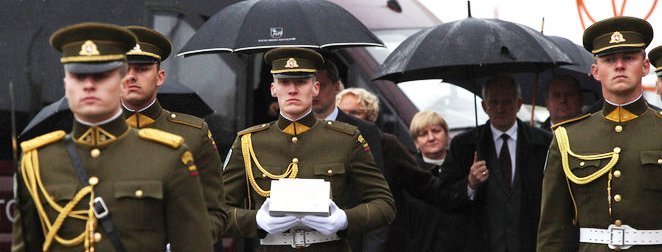O P I N I O N
by Dovid Katz
It is both right and laudable that University College London, the School of Slavonic and East European Studies and other partners are organizing a “Round Table Discussion: Anti-Soviet Resistance in the Baltic States” in central London, scheduled for 5 November 2013, 2 to 6:30 PM, with free admission for all (free tickets here; Facebook page here).
Nevertheless, there is cause for concern when the embassies of Estonia, Latvia and Lithuania are key sponsors. The reason for that is that all three Baltic governments, like some others in the region, have invested heavily to manipulate the study of history, and the memory of the West more generally, in the direction of ultranationalism, including the glorification of Nazi war criminals and promotion of “Double Genocide” politics via the 2008 Prague Declaration.
Those who stood up for freedom and human rights for all citizens, and against the evils of Stalinism and other forms of Communist misrule deserve not only credit and memorialization, but the inclusion of their struggle more prominently in the history of modern Europe. And what better way to go about this than to organize open and balanced round tables at major Western seats of higher learning?
FOR CONSIDERATION
“Honoring the genuine heroes of the East European struggle against Communism is a most noble goal. For the effort to succeed, states must withdraw in principle from honoring Holocaust collaborators and perpetrators who are no heroes.”
—Defending History, Nov. 2013
But in the case of the Baltics and some neighboring states, one encounters a set of issues that no academic round table at a Western university should shy away from in intellectual cowardice, no matter who the event’s sponsors might be. These states have on occasion in recent years invested in the glorification of Holocaust collaborators, in some cases even perpetrators, under the cover of “anti-Soviet resistance.” At the end of the day, virtually all of Hitler’s East European collaborators were “anti-Soviet,” a circumstance which cannot absolve, and must not be seen to absolve, the guilt of the mass murderers of civilian populations.

Honoring a hero of anti-Soviet resistance? The May 2012 reburial with full honors amidst glittering events of the 1941 Nazi puppet prime minister who personally signed the order for Jews of his own city (Kaunas) to be sent to a concentration camp, and a second order for incarceration of all the rest in a ghetto.
We are not uncovering some conspiracy or plot. This is all out in the open. To cite examples from very recent times: Estonia’s “Valentine’s Day Law” that makes way for honoring of that country’s Waffen SS. Latvia’s annual Waffen SS parades in central Riga with the support of high political figures. Lithuania’s state-sponsored reburial and glorification of Hitler’s 1941 puppet prime minister, and the shameful phalanx of street names (and a university lecture hall) immortalizing Holocaust collaborators. Estonia’s Lihula monument, Latvia’s shrine in Bauska and Tuskulėnai Park in Vilnius are further examples of the issue, as are city-center museums in Riga, Tallinn and Vilnius.
The lightheartedness with which Nazi atrocities are forgiven in some places is evident from failure to vigorously prosecute Nazi war criminal suspects, as steadfastly pointed out over the years by the Simon Wiesenthal Center. But it is not an isolated feature. It is part of a larger movement to rewrite history in the direction of Double Genocide, and in the spirit of that movement’s central document, the 2008 Prague Declaration (finally countered in some measure by the 2012 Seventy Years Declaration). It is part of the state-financed movement to downgrade, trivialize and obfuscate the Holocaust, while pursuing a series of concomitant ruses that have included the inflation of the definition of “genocide” and extending to the extreme case where Holocaust survivors alive because they joined the anti-Nazi resistance have been defamed by the state, in effect for surviving. Apologies are still awaited.
See also:
Evaldas Balčiūnas, Milan Chersonski & Collaborators Glorified sections; Streets, squares and university lecture halls named for Nazi collaborators and perpetrators
The fine hard-working peoples of these East European countries are not responsible for the excesses of their far-right nationalist establishments that squander resources in the pursuit of history revisionism. All three Baltic states have become praiseworthy stable democracies on nearly all counts. It is the true friend who will criticize a stubbornly lingering weakness rather than sweep it under the rug. Moreover, the fears of a huge and unpredictable neighbor to the immediate East are wholly justified and require firm and permanent NATO and EU vigilance and commitment to the security of the democratic states of Eastern Europe.
But that commitment to security in the future does not entail the stifling of debate in the free academic institutions of the West, of which both UCL and the School of Slavonic and East European Studies are proud exemplars.
The state-sponsored glorification of Nazi perpetrators under the umbrella of anti-Soviet resistance is an important and frankly indispensable topic for the upcoming Round Table. It merits being the focus of at least one invited speaker.
Hopefully, the powers that be will ensure that the issue is not suppressed in the charming Gustave Tuck Lecture Theatre on Gower Street on the fifth of November this year.
Details of the Round Table:
https://resistanceinthebalticstates.eventbrite.co.uk/